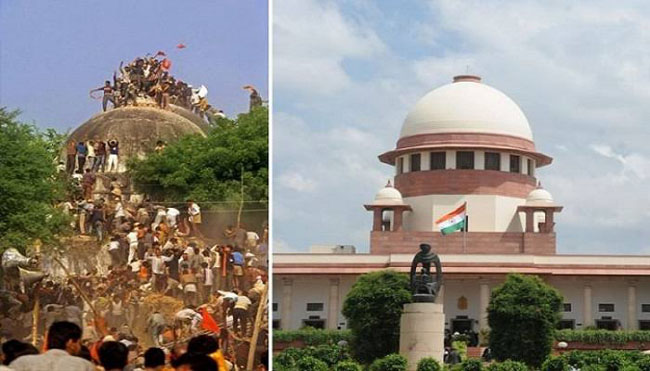New Delhi … News Time
The Supreme Court of India, while deciding the Babri Masjid case, directed the central government to construct a scheme within 3-4 months and hand over the land to the Hindus for the construction of the temple. According to Indian media, a five-member bench of the Supreme Court, headed by Chief Justice Ranjan Gogoi, heard the verdict regarding the Babri Masjid. Court rejects Sunni Central Waqf Board’s request, says Babri Masjid Temple was demolished the Allahabad High Court’s decision to divide the disputed land into three parts was wrong.
Indian Supreme Court Chief Justice Ranjan Gogoi said there was no evidence that prayers were ever conducted on this land before 1856 however, the structure on which the Babri Masjid was built has no Islamic background. The case can be decided not on faith and belief but on claims. Historical statements indicate the Hindus’ belief that Ayodhya was the birthplace of Ram. The Indian Chief Justice said that there is evidence that before the British came, Hindu Ram Chabutra worshiped Sita Rasoi, evidence in the record shows that the disputed land was owned by Hindus.
During the hearing, the Chief Justice remarked that this court should accept all the beliefs and accept the worshipers’ beliefs. The court must maintain balance. Hindus consider Ayodhya as Ram-Janmabhoomi, they have religious sentiments, and Muslims call it Babri Masjid. The Hindus believe that Bhagwan Ram was born here. The court ordered that 5 acres of land in Ayodhya be given to Muslims as a substitute for the construction of the mosque. The Indian Supreme Court has directed the central government to establish a scheme of trust in the area and submit a scheme within 3-4 months to hand over the land to the Hindus for the construction of the temple.
Earlier, the Indian Supreme Court had formed an arbitration team headed by Muslim Judge FM Khalifullah to resolve the disputes between Muslims and Hindus outside the court of Babri Masjid and Ram Temple land, the team included Shri Shri Ravi Shankar, the spiritual guru of the Hindus, and Shri Ram Panchao, senior lawyer. The committee, however, could not come to a conclusion. The Allahabad High Court had earlier ruled in the Babri Masjid case on September 30, 2010. In it, three judges had ordered to divide the two acres of Ayodhya’s 77.7 acres into three parts. One-third of this land will go to Ramlila Temple, represented by the Hindu Mahasabha; one-third will go to the Sunni Waqf Board while the remaining one-third of the land will be given to Narmaohi Akhara.
It should be noted that the Babri Masjid was built by Zaheer-ud-din Babar, the founder of the Mughal Empire in 1528 and hence it is called Babri MosqueHowever, in 1949, the Hindus claimed to have found the idols from the Babri Masjid and declared it the birthplace of Ram. Subsequently, the matter came to the Supreme Court through various courts, committees and commissions. The three main parties were Nurmohi Akhara, Ramlila and Sunni Waqf Board.




